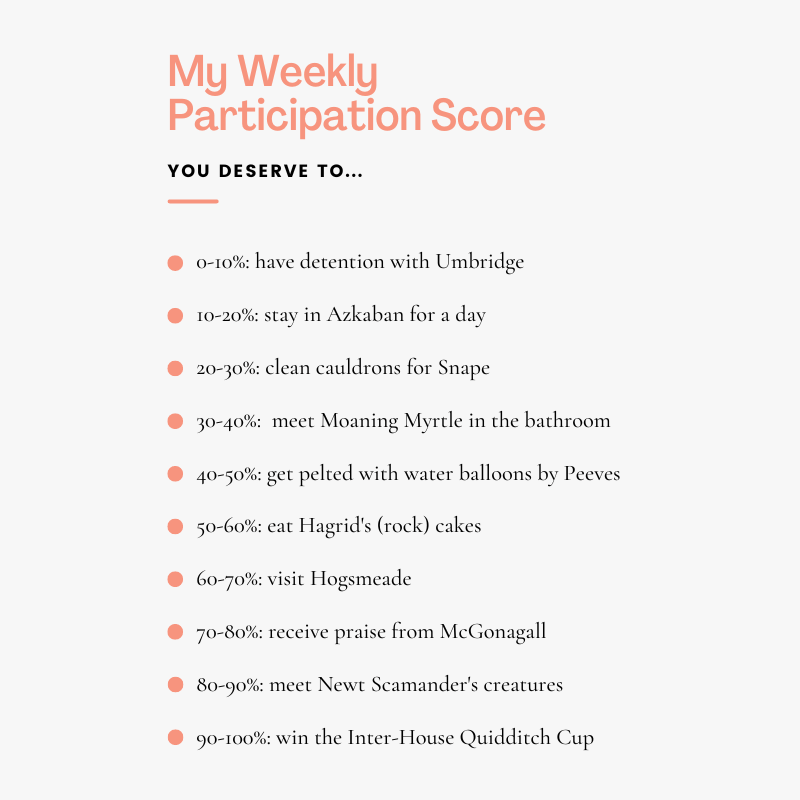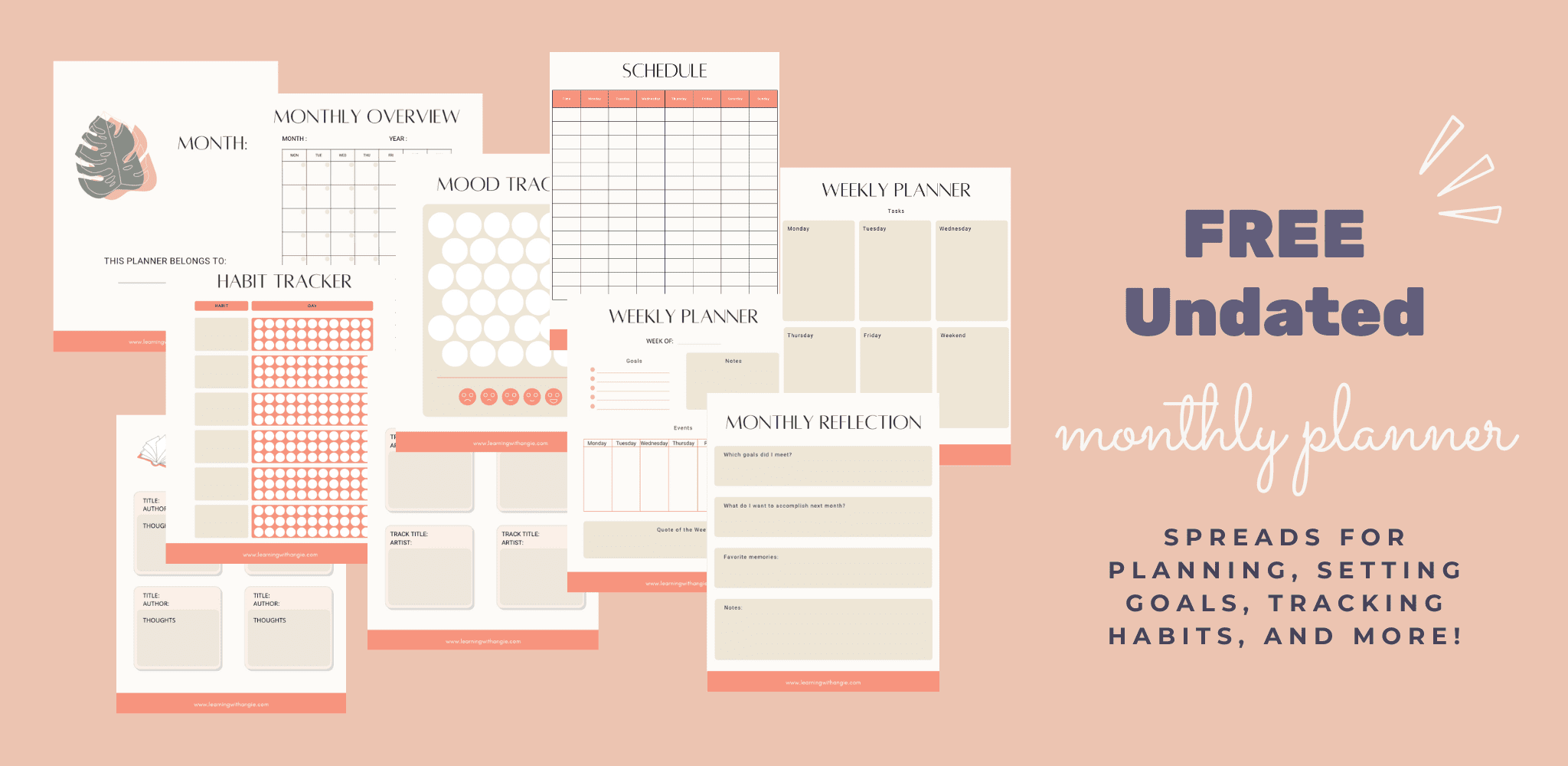

Are you having trouble focusing in online classes? Or do you feel unmotivated to study and meet deadlines? Then, read this article to find 27 super easy tips that will guide you through on how to get good grades in online classes.
First, a little context on my online learning experience:
I know how hard it can be to be a successful online student. When you’re sitting all alone in front of a computer screen, it’s easy to become distracted. Over time, you also begin to feel disconnected and unmotivated.
I’ve also been there. I was homeschooled for a year and then unexpectedly returned to virtual learning for nearly 1.5 years during the peak of the COVID-19 pandemic.
Both times, switching to online learning initially presented many difficulties. However, by implementing certain strategies, I was able to maintain straight A’s throughout both online learning experiences.
And in this article, I will share all of the strategies I used. By the time you finish reading this, you will also know exactly what to do to be a successful online learner.

In this article, you will learn how to:
- Set up a good study space
- Pay attention in class
- Take notes effectively
- Get your work done
- Study effectively
- Practice good self-care
Let’s dive in!
This post may contain affiliate links, which means that when you make a purchase through a link, I make a small commission at no extra cost to you.
Tip #1: Choose a designated study area
Having a good study environment is one of the most important tips for online learning success. It’s like the foundation of a building. If the foundation is weak, the building will collapse, no matter what high-grade materials are used to build it. The same goes for your study area and your online learning success.
Your study space should be one place in your home where the only thing you do is take your classes and get work done. That way, whenever you are in this space, your brain will automatically associate it with learning and studying.

Do NOT choose a space where you would typically watch TV, scroll on your phone, or do other non-academic related activities. This will reduce the temptations of engaging in distracting activities during online classes.
Also, make sure to choose a quiet space that is far from noisy areas like the family room or kitchen.
When I did distance learning, I designated one area to take all my classes and do all my work. I even avoided choosing my bedroom because I wanted to make sure that the moment I entered my bedroom at night, my brain would associate it with sleep and rest, not studying and work.
Tip #2: Keep your study space clean!
This is super important. Clutter creates distraction and stress.
Keep items in your study space minimal, and take time to organize it at the end of every day. You’ll be more motivated to return to it the next day.
Tip #3: Add a few personal accents
Personalize your space to suit your taste. For example, you could add a small stuffed animal or a picture of a positive memory.
If your study space is visually pleasing and contains elements that bring you joy, you’ll be more motivated to spend time there.
Tip #4: Make sure you have everything you need
Have your textbooks, planner, laptop/desktop device, note-taking supplies, etc. all in one place. This way, you won’t have to run around the house, which creates annoyance and distraction.
I would also suggest investing in stationery and organizers that you find to be aesthetically pleasing.
I feel much more motivated to study when I use my pastel Zebra Pen Mildliners, Paper Mate Ink Joys, Paper Mate Clear Points, and Post-It Flags. Seriously, it makes a difference.
Tip #5: Get a laptop stand
Ever feel pain in your neck and shoulders from sitting crouched over your laptop screen for hours? I know I did for a long time as an online student.
But ever since getting a laptop stand, I’ve been able to sit up straighter and look forward instead of down. It’s seriously super helpful, and I highly recommend getting one if you spend long hours in front of a screen.
You may also like “Productive Day Schedule for Students””Be Productive 12+ Hours a Day!”
Tip #6: Eliminate distractions
NEVER put your phone in the same vicinity as your study space. During virtual learning, my study space was upstairs. I would put my phone downstairs so that it wouldn’t be worth the trouble to retrieve.
Also, turn off notifications on your devices to prevent being distracted during the workday.
If you have an iPhone or iPad, you can go to Settings > Notifications > Scheduled Summary and set the notification summary to be at the end of the workday. This way, all of your notifications will be delivered at one specific time.
On my MacBook (which I used to take my online classes), I would turn on Do Not Disturb, accessed by going to Settings > Notifications > Do Not Disturb. This way, I didn’t receive incoming calls (unless I chose to) or other notifications. You can customize your preferences for when you want Do Not Disturb to be on and whether to allow calls or repeated calls.

Pay attention in class
Tip #7: Turn on your camera
Many professors/teachers already require this, but even if they don’t, you should. It goes without saying that turning on your camera holds you accountable for paying attention.
It also makes your teachers happier! Imagine speaking to a screen of boxes with names in ZOOM, not knowing if anyone cares about what you’re saying.
That’s like preparing a speech, only to face an audience all scrolling on their phones. That’s a terrible feeling!
Tip #8: Engage in class
Since student mics are muted the majority of class, it’s easy to stop participating and paying attention.
To fix this, hold yourself accountable for participating at least once in each class session. You can ask questions, answer questions, or participate in discussions.
To hold yourself accountable, write down the names of all your classes on a sticky note each day. Put a check next to each one that you participated in. Save all of the sticky notes.
At the end of each week, count all of your checks and divide them by the total class sessions you had.
Create a scoring system for yourself. For instance, here’s a scoring system you can use:

Treat participation as game. You’ll not only feel more motivated to pay attention in class, but you’ll save a lot of time. If you pay attention in class, you won’t need to self study as much!
Tip #9: Actively take notes in class
If you simply stare at the screen and try to listen to a lecture, it’s very easy to get distracted. Taking notes by hand will help you recall the information better. Additionally, you’ll be forced to focus more than if you were to just listen.
Take Effective Notes
Tip #10: Keep all your notes for each class in one place
Staying organized is so important! Make sure to keep your notes organized by class. This way, when you study, you will have no problem finding your notes.

I personally like using a binder with dividers labeled with my classes. I use Post-It Flags to tag specific chapters within each class.
I’ve also used Notability, which is a wonderful note-taking app to take and keep track of notes. You can create folders, as well as dividers within folders to organize your notes.
I like to label the folders with the semester and the dividers with the names of my classes. However, you can also label the folders with the names of classes and the dividers with specific chapters within each class.
Tip #11: Have a structure for note-taking
It takes some time to figure out the best note-taking structure that works for you. However, you should definitely take the time if you want to get good grades. If you have a consistent note-taking structure, it’ll be much easier to study. Our brains like structure and consistency.
For example, when I take notes for math, I write down and highlight important terms and formulas for each section. Next, I summarize specific concepts in my own words. For each concept, I write a step-by-step solution for a related practice problem.
When I go back and study, my attention is immediately drawn to the important terms and formulas I need to study. I can review summaries of concepts that are easily understandable because I wrote them in my own words. I can also see how the concepts are applied step-by-step. In this way, I don’t leave anything out when preparing for an upcoming test.
You may also like “How to Pass a Class You Hate (How I Went From a B- to A+”
Tip #12: Write down confusing topics on sticky notes
If there’s something you hear in class that you don’t fully understand, jot it down on a sticky note. Put the sticky note in your notes, so that when you study, you can’t miss it.
Stay On Top of Work
Tip #13: Have a planner
You need to create a system to hold yourself accountable. Having a physical planner or a virtual planning app is extremely important.
You should keep all your planning in one place so that you can just take one look and know what you need to do.
If you’re looking for a planner, make sure to check out my free undated monthly planner! It contains the exact spreads I used to stay organized during online classes.
Tip #14: Create a daily schedule
One of my biggest tips for being a successful online student is to set a schedule for yourself.
It’s important to designate time blocks within the day to specific tasks. This way, you’ll know exactly what you should be doing each hour of the day, just as if you were at a face-to-face school. Make sure to include breaks in your schedule as well!
Tip #15: Create a monthly overview
Have a monthly calendar, where you write down all of your major project deadlines, tests/quizzes, and events. When you have everything in one layout, it’s much easier to see how you should break up larger assignments and study for tests.
Planning ahead is super important!

Tip #16: Break up work into manageable chunks
Once you create your monthly overview, decide how you will spread out larger projects and test studying over several days (or possibly even weeks).
For example, if you have a large project, determine the steps you will need to take to complete it (e.g. research, drafting, finalizing). Estimate the amount of time you will need to complete each step, and set deadlines for when each step needs to be completed.
Tip #17: Create a to-do list
Every. Single. Day. I cannot stress this enough.
I know this sounds obvious, but sometimes it’s easy to get lazy and not do it. I’ve done that before, and I’ve found that my productivity level drops SIGNIFICANTLY when I don’t make a to-do list.
Having a to-do list allows me to clearly see what I need to do so I don’t feel overwhelmed. The moment I sit down to work (in my designated study space), I know exactly what I need to do.
Also, as I check off items on my list, I feel super accomplished. One of the greatest feelings is seeing every task checked off in my planner at the end of a busy day. It’s a tangible way to see how much I’ve gotten done.
Study Effectively

Tip #18: Don’t procrastinate on studying!
I know, easier said than done. However, oftentimes, I find that procrastination results from a feeling of being overwhelmed, which can be fixed.
I’ll admit, I’ve been guilty of procrastinating to study for an exam and then stressing a TON two days before. The reason I procrastinated was because I was intimidated by the idea of studying. But all procrastination did was give me a lot of headaches and sleepless nights.
So how can this be fixed? That leads me to the next tip”¦
Tip #19: Break up studying into chunks
When you have an exam coming up, first make a list of what topics will be covered. Estimate how much time you will need to study for each topic, and spread them out over the course of a few days (or even weeks if it’s a midterm or final exam).
That way, when you look at your daily to-do list, you won’t just see “study for ___ exam”. You will have a list of specific topics to study, which is much less overwhelming.
Also, make sure to leave time in your study schedule for the next tip.
Tip #20: Don’t just reread your notes or textbook””practice!
Practice is truly key to solid comprehension! When you practice, you don’t need to stress as much over memorization. This is because by implementing what you’ve learned in practice, you gain a stronger conceptual understanding.
A clear example is essay exams for English class. No matter how many times you look over the essay outline handout or reread the definitions of literary devices, you won’t become a better writer. Instead, you need to practice writing essays (or at least outlining essays) in response to practice prompts.
Practice is the only way to bridge the gap between theoretical concepts and application. And in high school, college, and beyond, application is what’s tested.
Tip #21: Use online resources
If rewatching a lecture, rereading your notes, or reviewing the textbook isn’t working, it doesn’t mean that you’re hopeless at a topic. You just need it to be taught in a different way.
Do a quick Google search if you’re confused about a topic, and tons of websites and videos will pop up. Just make sure you choose a reputable source.

Chances are, there are already many in-depth tutorials on what you’re learning. Find one that suits your learning style.
Tip #22: Reach out to your teacher
If you don’t understand a topic, you can also reach out directly to your teacher. Send a quick email or chat for a few extra minutes after class to let them know your confusion points.
Most teachers will be more than happy to help out. I had several teachers who will willing to meet with me online during lunch break or after class.
Tip #23: Check how thorough your understanding is
Albert Einstein once said, “If you can’t explain it simply, you don’t understand it well enough.” If you’re uncertain about whether you fully understand a topic, see if you can explain it thoroughly in simple terms.
Imagine that you’re teaching someone who knows NOTHING about the topic. If you can explain the topic fully and have them understand, you definitely have a strong understanding.
Practice Good Self-Care
Tip #24: Go on daily walks
Not only is it easy to feel cramped and tired after long hours in front of a screen, but your eyes also become very strained. Instead of scrolling on your phone during breaks, go outside for a nice stroll. It doesn’t have to be long””just 15-20 minutes can make a difference on your mood and energy level.
Tip #25: Exercise
At a face-to-face school, you would need to walk around campus to get from class to class. But when taking online classes, it’s easy to become a lot less active. Becoming more sedentary is not only bad for your health, but also results in lower energy levels.
As such, you should set apart time each day to exercise. It doesn’t have to be a long time. Even just 20 to 30 minutes a day of getting your heart pumping can do wonders for your energy levels.

You can go for a run or follow a dance workout online. Or, if you’re not a fan of cardio, there are tons of low-intensity and strength workouts on Youtube with and without equipment. I personally enjoy doing a mix of all throughout the week!
Tip #26: Talk to classmates
It’s easy to feel isolated when taking online classes. Make sure to talk to classmates””help each other out with understanding topics and studying motivation.
Making connections with others in online classes is crucial for feeling engaged and can help you feel less stressed.

Tip #27: Reward yourself for achieving goals
Following a tight schedule can be exhausting and mentally draining. Make sure to reward yourself when you achieve goals, like turning in a large project or acing a test.
Watch a movie with friends, read a good book, or take a nice long bubble bath””the possibilities are endless!
Conclusion
If you’ve reached the end of this article, then you’re already on your way to being a successful online student! Now, you just need to go and implement these tips in action.
To help you get started, please make sure to download my free undated monthly planner, which can be used any time of the year! It contains:
- A monthly cover page
- A monthly overview
- A playlist page
- A books read page
- A habit tracker
- A mood tracker
- A detailed weekly planner
- And a monthly reflection page
I hope these 27 tips taught you a lot about how to get good grades in online classes. Which ones will you be implementing? Let me know in the comments below!

Learning With Angie is a place to share honest, unfiltered advice to promote student success. So if you’re a student (high school, college, or beyond) looking for tips on productivity, studying, personal growth, and more to reach your potential, this is the place! To read more about Learning with Angie, click here.

















